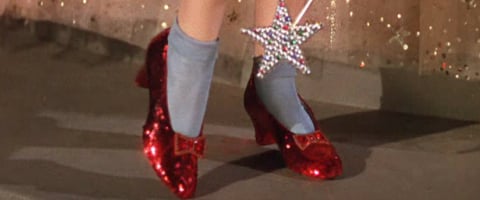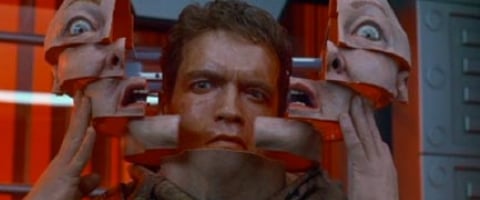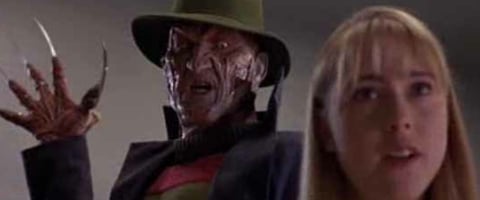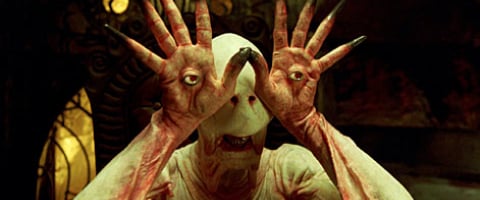The Dream Is Real: Five Movies That Do Imaginary Worlds Better Than Sucker Punch

Tomorrow, Zack Snyder’s Sucker Punch will hit theaters. If you’ve been reading the reviews, you’ve probably noticed a similar theme in the complaints: while visually spectacular, the story is an absolute mess. Setting aside a complete lack of character development and numerous other problems, one of the film’s greatest flaws is that there’s little or no tie in the real world occupied by the girls in the mental hospital and the fantasy world where most of the movie takes place. Only one percent of the film actually takes place at the hospital, and it's never exactly clear what’s going on there while the five girls are battling the dragons and World War I zombies they've cooked up in their minds.
Sucker Punch failed to get it right. But there are movies out there that not only take place largely in dream worlds, or places existing entirely within a character's head, but do it exceptionally well. We spent a week figuring out exactly how to define these-- places like Narnia, Neverland and Wonderland are real, so they don't count, and movies like American Psycho and Jacob's Ladder are more about psychotic breaks with reality than clearly separate fantasy worlds. Finally we narrowed it down to five movies that give you reason to care about the dream world, whether by defining then breaking its own rules, never making you clear on where reality ends, or pulling the wool over your eyes until the last second that it's a dream at all. Below is our list of five films that, unlike Sucker Punch, make you truly want to believe the fantasy.

The "it was only a dream" ending is impossible to get away with these days, but The Wizard of Oz not only got there first but did it better than anybody else. The spectacle of Oz is what we all remember, the colors and the witch and the horse of a different color, but Oz is a magical land that also reflects back to Dorothy what she needed most; a girl tired of a drab life goes to a land exploding with color, only to find herself homesick and accompanied by three friends who are unnervingly like the farmhands she's left back home. When Dorothy wakes up in bed muttering "there's no place like home" and is told by her loved ones that it was all only a dream, we're with her in believing Oz was a real place, but the older you get the easier it is to side with Auntie Em too.
When we remember The Wizard of Oz it's not as some fantastical story that some teenaged girl cooked up-- everyone, no matter how old, believes in Oz while watching that movie as fervently as Dorothy does. Really, the film gives you no choice-- there's no clue given beforehand that it's all unreal, and the "you were dreaming" end really just pulls the rug out. But something also makes sense about a girl as remarkable as Dorothy coming up with a place as amazing as Oz-- a dream world that's powerful and real no matter what Auntie Em may claim.

Inception
Inception has been somewhat justly criticized for the mounds and mounds of exposition that make up its first act-- here's how dream thievery works, here's what you do when you're there, here's how you get out, here's how Ellen Page can answer four more of your questions. But once that's all out of the way, and we clearly understand the stakes and consequences of invading the dream world, we're rewarded with a solid hour of the most satisfying, jaw-dropping entertainment imaginable. Christopher Nolan knew none of the visual dazzle of the dream scenes would matter if they didn't have ramifications in real life, so he's careful from the beginning of the heist to set up the ultimate stake: for this particular heist they're under such a deep sedative that death in the dream will equal death in reality.
Your Daily Blend of Entertainment News
Making that not just a rule for his film in general, but one that changes halfway through, allows his characters to be forced into extraordinary risks-- they're accustomed to dream worlds without the possibility of death, and work accordingly-- but also constantly fearing for their lives. Separately from it all, but also her own embodiment of the fear of death, is the spectre of Mal, Dom's ex-wife who is only able to haunt him within this world. We fear Mal and the death of these characters, so that even when he's flipping and flying us through this spectacular world, Nolan is sure to keep our feet close to the ground as well.

Total Recall
Total Recall’s power lies in its complete and utter uncertainty. If we were sure exactly what we were watching, we might be bored or horrified, but because the whole thing could essentially be an elaborate video game, we relish Doug Quaid’s vicious killing spree. Then again, because it might be real, we pause and take note of the staggering body count. To this day, I still have no idea if the relentless bastard completely upended the entire power structure on Mars or sat in a chair monitored by the nice people over at Rekall. I wouldn’t have it any other way.
Dreams are only fun while you’re in them. You race around getting up to superhuman shenanigans without the slightest care of what percentage of a planet you might have completely wrecked, and then abruptly it all ends. Just like that, the moment is gone and you’re left to shake your head at the outlandishness your brain was convinced was real thirty seconds prior. Total Recall never lets you out of that dream. Because it leaves you there, sweating profusely with a hot gun smoking like a hot chick in a 1930s studio piece, that moment of clarity and realization never comes.
In theory, Total Recall is either the quintessential example of all this list is trying to explore or a brilliant science fiction/ spy thriller no more at home here than a Bourne flick. In reality, it doesn’t matter. We never wake up; so, who the fuck are you to tell us it’s not real?

When you were a kid and had a terrifying nightmare, your parents would always say the same thing to try and help you get back to sleep: “It’s only a dream.” This is why Wes Craven’s A Nightmare on Elm Street is so brilliant. Set in a world where a dead child-murderer named Freddy Krueger can attack people while they sleep, the film manages to make dangerous the one place where you think you’re safe. Even better, the dream world is inescapable, as we all need sleep to survive. The movie heightens stakes both in the real world, where the protagonists have to fight to stay awake, and in the nightmare – where Krueger can run you through with his knife glove. Tina might feel safe having her tough-guy boyfriend Rod in the room, but that’s not enough to stop Freddy. Dragged along the walls, repeatedly being sliced by razors before dropping to the bed below--it might all happen in a dream, but it’s all very, very real.
A Nightmare on Elm Street creates genuine consequence in both worlds, and, as a result, the audience is able to take much more away from it. Horror movies have spent decades trying to give moviegoers nightmares, and Craven’s film not only does that, but keeps you from reassuring yourself that the bad dreams can't hurt you.

Pan’s Labyrinth
For children, the line between dreams and wake is fuzzier than it will ever be again-- games of pretend take on enormous significance, and real-life traumatic or eventful things can sometimes only be understood through fantasy. In Pan's Labyrinth Guillermo del Toro takes that basic truth to a terrifying and captivating extreme, depicting a young girl's journey through a fantasy world that's probably, but not definitely, her invention to cope with a real world that's even more harrowing. As with many other films on this list, del Toro keeps the audience engaged by blurring the line between reality and fantasy, never knowing when to stop wondering if the Faun will appear around the corner. But Pan's Labyrinth is in taking it a step further, drawing that blurred boundary back to our own childhoods; the fantasy world that Ofelia inhabits isn't necessarily all that different from the ones we ourselves created.
In some ways the fantasy world of Pan's Labyrinth is the audience's entry into the real world, not the other way around; Fascism-dominated Spain is a hard place and time for most audiences to understand, but the enchanting puppet work of the Faun and even the Pale Man-- both embodied by the limber and amazing Doug Jones-- strike at a core wonder in any child who ever marveled at the Muppets. When the film reaches its heartbreaking conclusion, that comfort we find in fantasy-- even the dark, scary fantasy of Pan's Labyrinth-- is crucial to walking away in anything but despair. Ofelia's fantasy world has taught her strength and given comfort, but at the end it's the audience who relies on it most to make it through.

Eric Eisenberg is the Assistant Managing Editor at CinemaBlend. After graduating Boston University and earning a bachelor’s degree in journalism, he took a part-time job as a staff writer for CinemaBlend, and after six months was offered the opportunity to move to Los Angeles and take on a newly created West Coast Editor position. Over a decade later, he's continuing to advance his interests and expertise. In addition to conducting filmmaker interviews and contributing to the news and feature content of the site, Eric also oversees the Movie Reviews section, writes the the weekend box office report (published Sundays), and is the site's resident Stephen King expert. He has two King-related columns.
